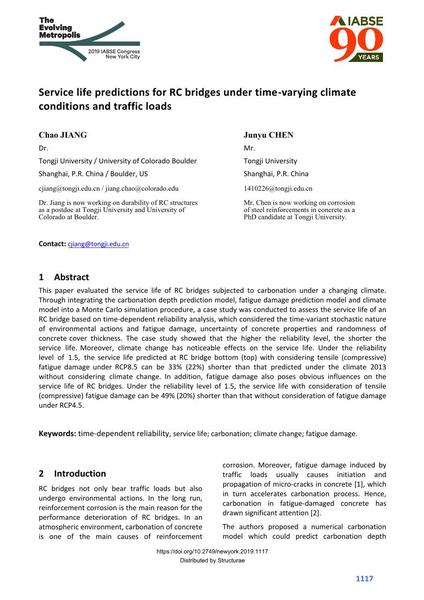Service life predictions for RC bridges under time-varying climate conditions and traffic loads

|
|
|||||||||||
Bibliografische Angaben
| Autor(en): |
Chao Jiang
(Tongji University / University of Colorado Boulder)
Junyu Chen (Tongji University) |
||||
|---|---|---|---|---|---|
| Medium: | Tagungsbeitrag | ||||
| Sprache(n): | Englisch | ||||
| Tagung: | IABSE Congress: The Evolving Metropolis, New York, NY, USA, 4-6 September 2019 | ||||
| Veröffentlicht in: | The Evolving Metropolis | ||||
|
|||||
| Seite(n): | 1117-1122 | ||||
| Anzahl der Seiten (im PDF): | 6 | ||||
| DOI: | 10.2749/newyork.2019.1117 | ||||
| Abstrakt: |
This paper evaluated the service life of RC bridges subjected to carbonation under a changing climate. Through integrating the carbonation depth prediction model, fatigue damage prediction model and climate model into a Monte Carlo simulation procedure, a case study was conducted to assess the service life of an RC bridge based on time-dependent reliability analysis, which considered the time-variant stochastic nature of environmental actions and fatigue damage, uncertainty of concrete properties and randomness of concrete cover thickness. The case study showed that the higher the reliability level, the shorter the service life. Moreover, climate change has noticeable effects on the service life. Under the reliability level of 1.5, the service life predicted at RC bridge bottom (top) with considering tensile (compressive) fatigue damage under RCP8.5 can be 33% (22%) shorter than that predicted under the climate 2013 without considering climate change. In addition, fatigue damage also poses obvious influences on the service life of RC bridges. Under the reliability level of 1.5, the service life with consideration of tensile (compressive) fatigue damage can be 49% (20%) shorter than that without consideration of fatigue damage under RCP4.5. |
||||
| Stichwörter: |
Lebensdauer Carbonatisierung
|
||||
